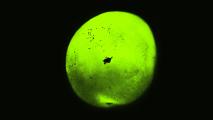The DNA editing tool known as CRISPR has taken medical research by storm, offering up potential treatments from stem cells to gene therapy. But scientists have invented a new use for CRISPR: rapidly diagnosing anything from cancer-causing mutations to viral infections with the ease of an at-home pregnancy test or a blood sugar meter. This could revolutionize diagnosis of things like Ebola and Zika, especially in field hospitals and remote locations, like the Congo.
How It Works: Unlike older methods of gene editing, CRISPR allows you to make extremely specific changes to DNA—the enzyme cuts whatever and wherever you tell it and nowhere else. This makes it valuable for finding and deleting malfunctioning DNA, turning off viruses, or inserting new genes.
But you can also tweak the system a bit to quickly diagnose diseases without a big, expensive lab setup. CRISPR’s ability to hunt down very specific strands of DNA can be combined with a fluorescent molecule that literally lights up when it finds its target, like a virus or a cancerous mutation. Combined with proteins called Cas12 or Cas13, after CRISPR homes in on its target, it then cuts a “reporter” molecule, causing it to glow. They’ve dubbed these systems DETECTR and SHERLOCK.
Why It’s Awesome: This is really exciting for lots of reasons. Unlike many diagnostic tools, which are often just looking for indirect signs of cancer or infection (like proteins or antibodies), these tests are identifying specific strands of actual viral DNA, making them much more reliable. They can also distinguish between different strains of the same virus. Recent advances have made SHERLOCK almost four times more sensitive, meaning it can detect infections earlier, and also tell you (roughly) how far along those infections are. Another paper explains how doctors could customize the test in less than a week to test for a specific new mutation they’re worried about.
Why It Could Change Everything: The best part is that scientists have figured out how to put the tests into strips of paper, like a pregnancy test, which could be mass produced, stored at room temperature, and used in the field with no need for special instruments. As one paper put it, CRISPR has created a “portable, rapid, and quantitative detection platform” for viruses from HPV to Dengue and Zika. It could be especially valuable at the front lines of Ebola outbreaks in Congo and West Africa, allowing fast and early diagnosis of potential infections, and also telling doctors what strain they’re dealing with, which could tell them what vaccine to distribute.




